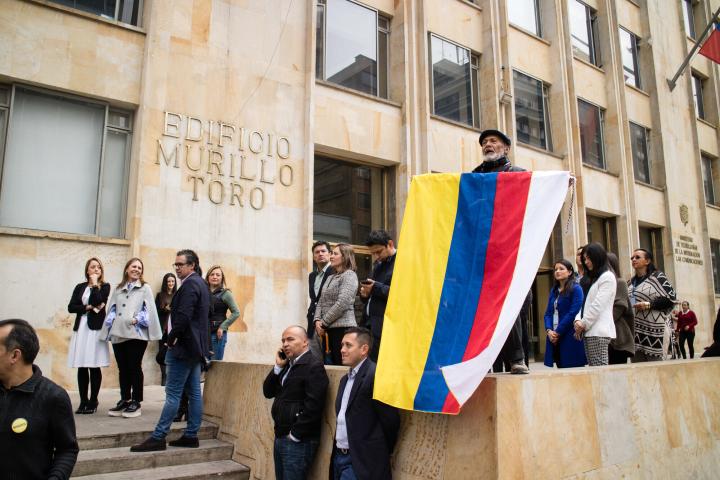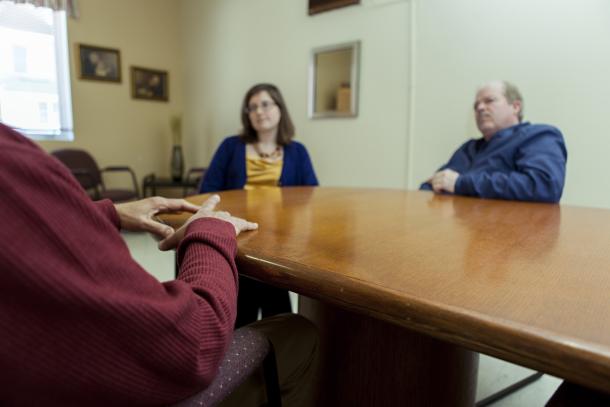Peace is more than a wish with words, not weapons

On the day the FARC handed over their weapons to the United Nations, a small group of colleagues and I went to the central plaza in Bogota to watch a live stream of the event. There was a collective intake of breath as the distinctive “click” echoed throughout the plaza when UN staff shut the container doors that held the guns. With one swing of a metal door, 7,132 weapons ceased to be used for war. And the FARC ceased to be an armed group.
While peace continues to elude Colombia, with smaller armed groups continuing to terrorize communities, that moment in the plaza was significant. It meant that, for these two groups at least, a decision had been made to embrace what the Anabaptist churches had been telling them was possible for decades: despite serious disagreement, the future of Colombia could be addressed in a way that involved a lot more dialogue and a lot less death.
One of the roots of violence in Colombia is fair access to political spaces like the Congress and the Senate to participate in decision-making about the future of the country. When I entertained visitors, I would often point out the small plaque near the city centre marking the spot where presidential candidate Jorge Gaitán was assassinated by his political opponents in 1948. With Gaitán’s death, hope of access to political systems to debate and decide together the future was also killed. For many Colombians, that moment marked a turning point where the current armed conflict began. Weapons, rather than words, seemed to be the only way to bring about the desired change to justice and equality.
After sixty years, and hundreds of thousands of deaths later, with the click of a plaza door, both the Colombian government and the FARC made a commitment to move the conflict to words, not weapons.
Now that I live in Ottawa, I try to remember that moment when I visit members of Parliament in their offices, especially when I don’t agree with them. I sometimes must take a deep breath and remind myself that here we are, deciding to use our words, not our weapons, to solve our problems. Despite our disagreements, or even perhaps because of our disagreements, we are in the same room as one another, committed to addressing big, challenging problems without guns.
One myth about peacebuilding is that it is passive – that to approach an issue with a peace perspective means to roll over and die. What I learned about peacebuilding in Colombia was the beauty of choosing to engage in a different way, of not shying away from naming real problems and working to address them. Peacebuilding was also a way of honouring the dignity of other people involved. It meant choosing a “third way” of coming to the table with creativity, rather than being either violent or passive. Taking that approach meant choosing to always see the other party as human, capable of change, and bearing the image of God, just like me.
Choosing a peace perspective also doesn’t mean shying away from real issues of power, privilege, inequality and racial injustice, or pretending they don’t matter. It does mean choosing an approach that’s different from the one that got us into the problem in the first place. How can everyone be invited into restoration and healing, to take responsibility for wrongs and also be part of a different path forward? In Colombia, both the government and the FARC had to be willing to commit to truth-telling and to repairing harm.
This holds true on a personal level as well as political. Sooner or later, in order to move forward, we must put down our weapons. We don’t get to choose everything in life, but how we approach a problem is fully under our control. Harm is still possible, but we can reduce the level of destruction by how we approach a conflict.
So how does this happen? I generally don’t carry around literal knives and guns. But I have a backpack full of mental ammunition that I am ready to pull out the moment I feel threatened. I want to speak first, make my points as strongly as I can, and shut down any opposition that could be forthcoming. It is all too easy to jump to the conclusion that other people are ill-informed or simply the problem and that then determines how I respond. When I think about it, I’m astounded at how quickly I am ready to draw my weapons.
So, here are some small practices I’ve been working on this month to replace my weapons.
- I remind myself that when I feel threatened, the other person or group also feels threatened in some way. We may disagree on everything else, but that similar emotion is the start of common ground.
- Practice different ways of approaching conversations with family and friends by starting the conversation with a curious question that tries to first understand the other person’s perspective, before sharing your own.
- Get enough sleep. Don’t go into a hard conversation hungry.
- Don’t forget to pause, repeat what I hear, and ask what I could be missing.
Reflection questions
A common understanding of peacebuilding is passivity. Take a moment to think about how you or others in your community understand peacebuilding. Do you see similarities or differences in the Colombian churches’ approach to peacebuilding? Is there anything that you would want to explore further about the power of words over weapons?
Identify a couple of spaces in your life where it is easy to pull out your weapons. Take a moment to imagine doing something else. What emotions arise?
Action steps
Try incorporating some of these practices into your conversations this month! And let me know how it goes: annavogt@mcccanada.ca.
Ordinary people
Meet some ordinary people just like you working for peace in their communities.
This month's ordinary people are Colombian churches and church members responding to violence. Read more about how churches across the country have responded to militarization in 2021, including a call to dialogue.
Featured resource

Conflict is a normal part of life. It arises in our workplaces, in our churches and with our families. Having meaningful conversations about tense issues is a necessary characteristic of committed relationships, resilient communities, healthy churches, and strong democracies. Jesus’s call to love our neighbours is reflected in the conversations we engage in with one another.
In this guide, we offer a few tips for having positive conversations around significant issues in hopes that we can create spaces for better disagreement with respect and authenticity.

